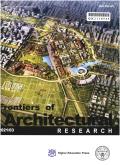Visitors' consistent stay behavior patterns within free-roaming scenic architectural complexes: Considering impacts of temporal, spatial, and environmental factors
IF 3.6
1区 艺术学
0 ARCHITECTURE
引用次数: 0
Abstract
GPS positioning data are increasingly utilized in environmental behavior studies to explore the spatial-temporal behavioral patterns of individuals. However, individuals' stay behavioral pattern and its influencing factors, which are particularly significant for the design and management of scenic architectural complexes, have not been thoroughly examined. Using GPS trajectory data collected from the Palace Museum in Beijing (China), this paper investigated the visitors' stay behavior patterns associated with temporal, spatial, and environmental influencing factors. Types of stay behavior and characteristics of stay in main stay areas were automatically recognized using Python algorithms for further and quantitative analysis. Results showed that visitors' stay time exhibited a consistent pattern regarding psychological time allocation, a relatively unsignificant pattern regarding lunch hour, and no clear pattern regarding fatigue feature. Grouped regression analysis showed positive linear relationships with similar slopes between the average stay length and the number of stay occurrences in each type of stay area. Partial correlation analysis revealed the underlying connection between the impact of seats and greenery on stay behavior. Individually, each of the two environmental elements showed limited effect on stay frequency and stay length, while incorporating greenery into seating areas would notably increase both stay frequency and stay length.
游客在自由活动的景区建筑群内的持续逗留行为模式:考虑时间、空间和环境因素的影响
在环境行为研究中,越来越多地利用 GPS 定位数据来探索个体的时空行为模式。然而,对于对风景建筑群的设计和管理尤为重要的个体逗留行为模式及其影响因素,还没有进行深入研究。本文利用从中国北京故宫博物院收集到的 GPS 轨迹数据,研究了与时间、空间和环境影响因素相关的游客逗留行为模式。利用 Python 算法自动识别了主要逗留区域的逗留行为类型和特征,并进行了进一步的定量分析。结果表明,游客的逗留时间在心理时间分配上表现出一致的模式,在午餐时间上表现出相对不明显的模式,而在疲劳特征上则没有明显的模式。分组回归分析表明,平均逗留时间与各类逗留区域的逗留次数呈正线性关系,且斜率相似。局部相关分析表明了座椅和绿化对停留行为的影响之间的内在联系。单独来看,这两个环境要素对逗留次数和逗留时间的影响都很有限,而在座位区加入绿化则会显著增加逗留次数和逗留时间。
本文章由计算机程序翻译,如有差异,请以英文原文为准。
求助全文
约1分钟内获得全文
求助全文
来源期刊

Frontiers of Architectural Research
ARCHITECTURE-
CiteScore
6.20
自引率
2.90%
发文量
430
审稿时长
30 weeks
期刊介绍:
Frontiers of Architectural Research is an international journal that publishes original research papers, review articles, and case studies to promote rapid communication and exchange among scholars, architects, and engineers. This journal introduces and reviews significant and pioneering achievements in the field of architecture research. Subject areas include the primary branches of architecture, such as architectural design and theory, architectural science and technology, urban planning, landscaping architecture, existing building renovation, and architectural heritage conservation. The journal encourages studies based on a rigorous scientific approach and state-of-the-art technology. All published papers reflect original research works and basic theories, models, computing, and design in architecture. High-quality papers addressing the social aspects of architecture are also welcome. This journal is strictly peer-reviewed and accepts only original manuscripts submitted in English.
 求助内容:
求助内容: 应助结果提醒方式:
应助结果提醒方式:


